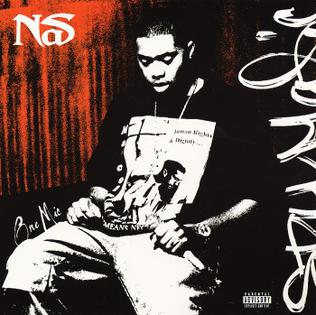| Why I Hate School but Love Education | |
|---|---|
 | |
| Video by | |
| Released | 2 December 2012 |
| Genre | Spoken word, Hip Hop |
| Length | 6:07 |
"Why I Hate School but Love Education" is a 2012 video by English spoken word poet Suli Breaks.
| Why I Hate School but Love Education | |
|---|---|
 | |
| Video by | |
| Released | 2 December 2012 |
| Genre | Spoken word, Hip Hop |
| Length | 6:07 |
"Why I Hate School but Love Education" is a 2012 video by English spoken word poet Suli Breaks.
The video conveys the message that, while education is good, educational institutions leave much to be desired. It features Suli Breaks rhyming his dislike of the unnecessary strictures of formal schooling. In the video, Breaks also outlines why young people are encouraged to get a formal education. [1]
Emi Kolawole of The Washington Post said, "Breaks's message taps into a very fundamental desire among young people to disrupt — that word ubiquitous to innovation — the educational system." [1] Steven Kalas of the Las Vegas Review-Journal said, "Breaks's motif is rhythmic, staccato narrative. But it's absent the percussive, droning cacophony accompanying most of rap or hip-hop." [2]

Nasir bin Olu Dara Jones, known professionally as Nas, is an American rapper and entrepreneur. Rooted in East Coast hip hop, he is regarded as one of the greatest rappers of all time. The son of jazz musician Olu Dara, Nas began his musical career in 1989 under the moniker "Nasty Nas", and recorded demos under the wing of fellow East Coast rapper Large Professor. Nas made his recording debut on Professor's group, Main Source's 1991 song "Live at the Barbeque".

Marion Hugh "Suge" Knight Jr. is an American record executive, former NFL player, and convicted felon, who is the co-founder and former CEO of Death Row Records. Knight was a central figure in gangsta rap's commercial success in the 1990s. This feat is attributed to the record label's first two album releases: Dr. Dre's The Chronic in 1992 and Snoop Dogg's Doggystyle in 1993. Knight is currently serving a 28-year sentence in prison for a fatal hit-and-run in 2015.

Joseph Anthony Hernandez, professionally known as Tony Touch, is an American hip hop break dancer, rapper, record producer and DJ of Puerto Rican descent.

Hip hop or hip-hop is a culture and art movement that was created by African Americans, starting in the Bronx, New York City. Pioneered from Black American street culture, that had been around for years prior to its more mainstream discovery, it later reached other groups such as Latino Americans and Caribbean Americans. Hip-hop culture has historically been shaped and dominated by African American men, though female hip hop artists have contributed to the art form and culture as well. Hip hop culture is characterized by the key elements of rapping, DJing and turntablism, and breakdancing; other elements include graffiti, beatboxing, street entrepreneurship, hip hop language, and hip hop fashion. From hip hop culture emerged a new genre of popular music, hip hop music.

"One Mic" is a song by American rapper Nas, released April 16, 2002 on Columbia Records and distributed through Ill Will Records in the United States. It was issued as the third single from his fifth studio album, Stillmatic (2001). The single peaked at number 43 on the Billboard Hot 100, making it Nas's third top-fifty hit on the chart.
Flocabulary is a Brooklyn-based company that creates educational hip hop songs, videos and additional materials for students in grades K-12. Founded in 2004 by Blake Harrison and Alex Rappaport, the company takes a nontraditional approach to teaching vocabulary, United States history, math, science and other subjects by integrating content into recorded raps. Flocabulary's website features videos, lesson plans, activities and assessment or with songs. The company's name is a portmanteau of "flow" and "vocabulary".

Love vs. Money is the second album by American singer-songwriter The-Dream. It was released on March 10, 2009, by Radio Killa and Def Jam Recordings.
Hassan El Hajjami, also known as Haspop, is a French stage director, choreographer and dancer.

"The Motto" is a song by Canadian rapper Drake featuring American rapper Lil Wayne. It is a digital iTunes Store bonus track from Drake's second studio album Take Care. "The Motto" premiered on Power 106 on October 31, 2011. Drake released the song on his OVO blog a day later. It was first played on rhythmic top 40 radio stations on November 29, 2011 as the album's fourth single.

Tabitha A. D'umo and Napoleon Buddy D'umo, known together as Nappytabs, are Emmy Award-winning married choreographers. They are best known for their choreography on the television show So You Think You Can Dance and for being supervising choreographers and executive producers of America's Best Dance Crew. Since being with the former, their choreography has received both praise and criticism. They own Nappytabs urban dancewear and have been working in the dance industry since 1996.

Prisoner of Conscious is the fifth solo studio album by American rapper Talib Kweli. The album was released on May 7, 2013. The album features guest appearances from Nelly, Miguel, Currensy, Kendrick Lamar, Marsha Ambrosius, Busta Rhymes and Ryan Leslie along with production by RZA, Boi-1da, Harry Fraud, S1, Terrace Martin, Oh No, and J. Cole among others.
Misogynoir is a term referring to the combined force of anti-Black racism and misogyny directed towards black women. The term was coined by black feminist writer Moya Bailey in 2008 to address misogyny directed toward black transgender and cisgender women in American visual and popular culture. The concept of misogynoir is grounded in the theory of intersectionality, which analyzes how various social identities such as race, gender, class, age, ability, and sexual orientation interrelate in systems of oppression.
Feminist activism in hip hop is a feminist movement based by hip hop artists. The activism movement involves doing work in graffiti, break dancing, and hip hop music. Hip hop has a history of being a genre that sexually objectifies and disrespects women ranging from the usage of video vixens to explicit rap lyrics. Within the subcultures of graffiti and breakdancing, sexism is more evident through the lack of representation of women participants. In a genre notorious for its sexualization of women, feminist groups and individual artists who identify as feminists have sought to change the perception and commodification of women in hip hop. This is also rooted in cultural implications of misogyny in rap music.
Darryll Suliaman Amoako, better known by his stage name Suli Breaks, is an English spoken word poet. He is best known for his spoken word videos on his YouTube Channel, Suli Breaks, his 2012 video "Why I Hate School but Love Education" and his 2013 video "I Will Not Let an Exam Result Decide My Fate".

"I Will Not Let an Exam Result Decide My Fate" is a 2013 video by English spoken word poet Suli Breaks.
"Wrist" is a song by American singer Chris Brown from his seventh studio album Royalty. It was launched along with an iTunes pre-order of the album on December 3, 2015. It was produced by The MeKanics and Khemasis and features rapper Solo Lucci. The song received mixed reviews from music critics and peaked at number 17 on the US Bubbling Under Hot 100 Singles, and number 46 on the US Hot R&B/Hip-Hop Songs chart.
"Picture Me Rollin'" is a song by American singer Chris Brown, from his seventh studio album Royalty. It was written by Brown, and produced by Dr3amforever and Dj-Wes.
Progressive rap is a broad subgenre of hip hop music that aims to progress the genre thematically with socially transformative ideas and musically with stylistic experimentation. Developing through the works of innovative US hip hop acts during the 1980s and 1990s, it has also been known at various points as conscious, underground, and alternative hip hop.

Johnathan Jamall Porter, known professionally as Blueface, is an American rapper. In October 2018, after releasing the music video for his song "Respect My Cryppin'", he became a viral meme due to his offbeat style of rapping. The following month, he was signed to Cash Money West, the West Coast branch of Birdman's Cash Money Records label.

When in Love is the first single from MC Lyte's third album Act Like You Know. It was released on August 22, 1991. Although its original version of the album is produced by Wolf & Epic, its single version includes a remix made with Carmen Rizzo.